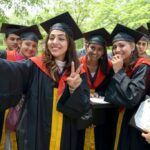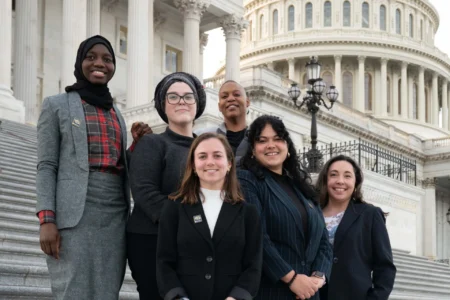Born and raised on Long Island, New York, David Campos faced racial discrimination and struggled with his cultural identity as the son of immigrant parents from Colombia and Costa Rica. This inspired him to advocate for marginalised children in underserved communities. Hence, his academic journey began with a bachelor’s degree in Public Policy and History. After graduating with the highest distinction, his desire to enhance educational opportunities made him choose the University of Notre Dame for his graduate studies over offers from Brown and Georgetown.
“The Keough School of Global Affairs’s emphasis on human development, in addition to the university’s Catholic faith, is what led me to pursue my master’s degree here, as it served as a prime example of how academia can foster dialogue around some of the world’s most complex issues,” he says.

Source: University of Notre Dame
Campos chose to pursue a Master of Global Affairs (MGA) as he was drawn to its comprehensive curriculum and unique offerings. True enough, courses in Geographic Information Systems in Social Science, International Law, and Public Policy and Behaviour Science provided him with technical skills and critical insights into the complexities of governance and human rights. However, it was the i-Lab practicum, notable guest speakers, and a diverse cohort of students from around the world that truly brought his education to life.
“i-Lab was critical in that it offered me a unique balance between furthering my academic career and receiving hands-on experiences with some of the most influential organisations in the world,” explains the graduate. “It was the first time I had the chance to engage in a project proposal phase, conducting interviews with high officials from the US and UK, and speaking with civil society members in West Africa.”
Meanwhile, his practicum included collaboration with the US State Department on the Global Fragility Act, where Campos played a key role in project management, financial oversight, and editorial duties. Beyond the classroom, he was a Pulte Family Fellow, which alleviated financial burdens and unlocked research opportunities with the Pulte Institute. He examined the relationship between migration and violence in Central America and worked to improve school transitions in Guatemala.
This exposure prepared Campos for his upcoming role as a Project Coordinator for the Monitoring, Evaluation, Research, and Learning team at DevTech Systems, Inc. “I applied to this job largely because of the topics and issues Dr. Paul Perrin spoke of throughout his class, which exposed me to the significance of programme design and the impact that monitoring and evaluation have on programme effectiveness,” shares the graduate.
This is precisely the types of outcomes the MGA programme aims to inspire. This full-time, two-year residential degree offers three concentrations: International Peace Studies, Sustainable Development, and Governance and Policy. All three pathways are as interdisciplinary as can be, allowing students to specialise by taking elective courses offered by the Keough School and other colleges at the University of Notre Dame.
Indeed, breadth sets this programme apart, unlike qualifications focused on international affairs or public policy. For example, while international relations typically examine interactions between nation-states and international organisations, global affairs include interactions with multilateral organisations, NGOs, corporations, religious-based organisations, and social movements. This interdisciplinary approach addresses multidimensional problems like poverty, hunger, and war, recognising that solutions require expertise from all sectors of society, including those most affected by these issues.

Source: University of Notre Dame
“I would argue that interdisciplinarity is the only way one can study, understand, comprehend and eventually contribute to peacebuilding and conflict resolution,” explains Professor Echavarría Alvarez, Professor of the Practice at the Keough School of Global Affairs and Director of the Peace Accords Matrix.
“For instance, let’s consider the implementation of a peace accord like the one in Colombia. It includes measures and commitments related to land reform, political participation, justice, verification, etc. Not one of those commitments can be understood with one discipline in mind; it is only possible to tackle it with a multidisciplinary perspective.”
Professor Echavarría Alvarez plays a key role in helping MGA students put knowledge into practice. “I’ve accompanied them in their field research, I have invited them to present at conferences, to engage with civil society organisations as much as with policy leaders, and I think that what students enjoy the most is the direct contact with people that they have only ‘read about’ in their textbooks or listened to in podcasts and social media,” she shares.
As shown by graduates like Campos, these experiences open doors far beyond the US Midwest, where the University of Notre Dame is based. Many have even established themselves in influential roles within Washington, DC — Keough School is a strong pathway to a career here, considering it has a dedicated office in the capital city. Graduates have built careers internationally too — their ability to succeed just about anywhere is often credited to the diverse real-world experiences they unlocked as MGA students.
Follow the Keough School of Global Affairs on Facebook, Instagram, X, LinkedIn, and YouTube












